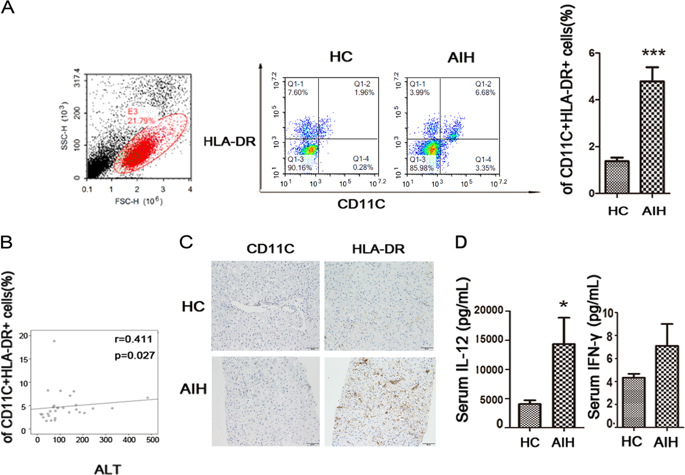当前位置:
X-MOL 学术
›
Cell Death Dis.
›
论文详情
Our official English website, www.x-mol.net, welcomes your
feedback! (Note: you will need to create a separate account there.)
Critical roles of conventional dendritic cells in autoimmune hepatitis via autophagy regulation.
Cell Death & Disease ( IF 8.1 ) Pub Date : 2020-01-13 , DOI: 10.1038/s41419-019-2217-6 Xiaoli Fan 1 , Ruoting Men 1 , Chen Huang 1 , Mengyi Shen 1 , Tingting Wang 1 , Yasmeen Ghnewa 2 , Yun Ma 2 , Tinghong Ye 3 , Li Yang 1
Cell Death & Disease ( IF 8.1 ) Pub Date : 2020-01-13 , DOI: 10.1038/s41419-019-2217-6 Xiaoli Fan 1 , Ruoting Men 1 , Chen Huang 1 , Mengyi Shen 1 , Tingting Wang 1 , Yasmeen Ghnewa 2 , Yun Ma 2 , Tinghong Ye 3 , Li Yang 1
Affiliation

|
Autoimmune hepatitis (AIH) is a necroinflammatory disease associated with interactive cell populations of the innate and adaptive immune systems. The contribution of conventional dendritic cells (cDCs) to AIH and the underlying mechanism remain poorly understood. The frequency of peripheral mature cDCs increased in AIH patients and was positively correlated with disease severity. In experimental autoimmune hepatitis (EAH), hepatic accumulation of mature cDCs was observed, along with an increase in the periphery. Sequentially, bone marrow-derived dendritic cells (BMDC) from EAH mice exhibit more proinflammatory function than those from control mice. In vitro, ConA treatment promotes the maturation of BMDCs, which are characterized by higher expression of MHC-II, costimulatory molecules and cytokine secretion. ConA also induced the expression of autophagy-related protein and the formation of autophagosomes in DCs. To further investigate whether ConA-induced DC activation is associated with autophagy, we utilized 3-MA and bafilomycin A1 to block autophagy flux and accessed the maturation and function of DCs induced by ConA. 3-MA and bafilomycin A1 inhibited the mature status and proinflammatory cytokine secretion and diminished the proliferation and differentiation of CD4+ T cells when ConA-induced BMDCs cocultured CD4+ T cells. We demonstrated that cDCs contribute to the pathogenesis of AIH through excessive maturation. Aberrant autophagy flux plays a vital role in the immunogenic maturation of cDCs in AIH, and tolerogenic cDCs by inhibition of autophagy flux can be exploited as a new therapeutic approach for AIH.
中文翻译:

常规树突状细胞通过自噬调节在自身免疫性肝炎中的关键作用。
自身免疫性肝炎(AIH)是一种与先天性和适应性免疫系统的相互作用细胞群相关的坏死性炎症性疾病。常规树突状细胞(cDCs)对AIH的贡献及其潜在机制仍然知之甚少。AIH患者外周成熟cDC的频率增加,并且与疾病严重程度呈正相关。在实验性自身免疫性肝炎(EAH)中,观察到成熟cDC的肝积累,并伴有外周血的增加。因此,来自EAH小鼠的骨髓来源树突状细胞(BMDC)表现出比对照组小鼠更高的促炎功能。在体外,ConA治疗促进BMDC的成熟,其特征在于MHC-II的高表达,共刺激分子和细胞因子的分泌。ConA还诱导DC中自噬相关蛋白的表达和自噬体的形成。为了进一步研究ConA诱导的DC活化是否与自噬相关,我们利用3-MA和巴氟霉素A1阻断自噬通量,并研究了由ConA诱导的DC的成熟和功能。当ConA诱导的BMDC共培养CD4 + T细胞时,3-MA和bafilomycin A1抑制了成熟状态和促炎细胞因子的分泌,并减弱了CD4 + T细胞的增殖和分化。我们证明了cDCs通过过度成熟有助于AIH的发病机理。异常自噬通量在AIH中cDC的免疫原性成熟中起着至关重要的作用,通过抑制自噬通量产生的致耐受性cDC可以作为AIH的一种新治疗方法。
更新日期:2020-01-13
中文翻译:

常规树突状细胞通过自噬调节在自身免疫性肝炎中的关键作用。
自身免疫性肝炎(AIH)是一种与先天性和适应性免疫系统的相互作用细胞群相关的坏死性炎症性疾病。常规树突状细胞(cDCs)对AIH的贡献及其潜在机制仍然知之甚少。AIH患者外周成熟cDC的频率增加,并且与疾病严重程度呈正相关。在实验性自身免疫性肝炎(EAH)中,观察到成熟cDC的肝积累,并伴有外周血的增加。因此,来自EAH小鼠的骨髓来源树突状细胞(BMDC)表现出比对照组小鼠更高的促炎功能。在体外,ConA治疗促进BMDC的成熟,其特征在于MHC-II的高表达,共刺激分子和细胞因子的分泌。ConA还诱导DC中自噬相关蛋白的表达和自噬体的形成。为了进一步研究ConA诱导的DC活化是否与自噬相关,我们利用3-MA和巴氟霉素A1阻断自噬通量,并研究了由ConA诱导的DC的成熟和功能。当ConA诱导的BMDC共培养CD4 + T细胞时,3-MA和bafilomycin A1抑制了成熟状态和促炎细胞因子的分泌,并减弱了CD4 + T细胞的增殖和分化。我们证明了cDCs通过过度成熟有助于AIH的发病机理。异常自噬通量在AIH中cDC的免疫原性成熟中起着至关重要的作用,通过抑制自噬通量产生的致耐受性cDC可以作为AIH的一种新治疗方法。











































 京公网安备 11010802027423号
京公网安备 11010802027423号